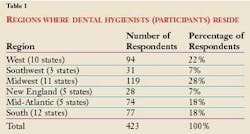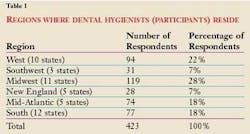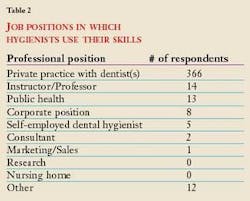Your Career,Your Thoughts
by Christine Hovliaras-Delozier, RDH, MBA
Professional Savvy, LLC, and RDH thank the dental hygienists who participated in the Career Assessment Survey (November 2003 issue). The participants spent much time composing meaningful answers to the many open-ended questions regarding their career and satisfaction in the dental hygiene profession.
The information is of great value to Professional Savvy and RDH in understanding your thoughts and areas that the dental hygiene profession needs to consider to enhance professional aspirations. Now let's get to the answers from the Career Assessment Survey!
Dental hygienists who participated in the Career Assessment Survey were from 46 states (Table 1). The states that were not represented by RDH readers who responded were Hawaii, New Mexico, North Dakota, Delaware, and Rhode Island.
Dental hygienists were distributed well across all categories in the number of years of practice:
• 0-5 years, 73 respondents
• 6-10 years, 73 respondents
• 11-15 years, 54 respondents
• 16-20 years, 45 respondents
• 21-25 years, 62 respondents
• 26-30 years, 54 respondents
• 31-35 years, 40 respondents
• Over 35 years, 22 respondents
The majority of dental hygienists work in a private practice with one or more dentists or in a specialty practice (Table 2). Three percent of respondents work as an instructor/professor and in public health, and 2 percent are in a corporate position.
The "other" job position category included working in a hospital, prison, or in a veterinary dental hygiene position. Volunteering was another position in which dental hygienists noted in this category. (Not all respondents answered this question.)
Job satisfaction
Overall job satisfaction among the 423 dental hygiene respondents showed that 72 percent are satisfied and 22 percent are not satisfied in their current position.
Let's take a look at job satisfaction by region (Table 3). The table shows that, overall, dental hygienists in all regions were satisfied in their current dental hygiene positions.
Although a sizeable majority of dental hygienists were satisfied in their current positions, there were many dental hygienists who were not satisfied in their current positions. Fifty percent of these respondents were not satisfied because of disenchantment with their employer(s); 16 percent had work-related injuries or pain; 12 percent felt that over time they have grown to regret their choice of dental hygiene as a career, and 2 percent stated that reasons were related to family.
Twenty percent of dental hygienists were unsatisfied in their current positions due to the following reasons:
• Lack of respect and appreciation from the dental team (employers, dental assistants, and sometimes the office manager)
• Lack of communication with the employer(s)
• Lack of salary increase
• Lack of benefits
• Demanding and unrealistic work environment
• Not being able to be a decision-maker or follow up with employer on patients treated during the day
• Bored, frustrated, and burned out
Career choices and parenting
Seventy-six percent of dental hygienists stated that dental hygiene was their first career. The remainder entered the profession from a variety of occupations, including dental assisting, dental technology, nursing, engineering, education, science, accounting, hotel management, retail, floral design, and as an entrepreneur.
One-third of the respondents were dental assistants and two-thirds of the respondents were in the other occupations listed previously.
Seventy-two percent of dental hygienists were parents when they completed the survey and 28 percent were not parents. Nineteen percent of dental hygienists were parents when they were enrolled in a dental hygiene program, and 81 percent were not parents when they were enrolled in a dental hygiene program.
Hygienists who were parents in dental hygiene school believed their role as a parent had relevance in selecting dental hygiene as a career. However, for those who were not parents in dental hygiene school, it did not have relevance.
Is there a glass ceiling in dental hygiene?
Seventy-five percent of dental hygienists felt there was a glass ceiling in the profession. The dental hygienists stressed that we need to work on this area within the dental hygiene profession in order to keep dental hygienists practicing and content with their careers, and not have them consider leaving the dental hygiene profession.
Several themes were identified in this important question regarding the "glass ceiling" that related to the lack of opportunities to advance one's career. These themes included:
• Teamwork issues with the dentist(s) and coworkers
• The salary and benefit dilemma
• State regulations
• Creation of a clinically advanced dental hygiene practitioner
• Career opportunities within the dental hygiene profession
Each one of these themes is highly important to a practicing dental hygienist. An elaboration on each theme follows.
• Teamwork — We need to work with our employer(s) as a team. This is a big issue and one that has to be dealt with in a professional manner. Some dental hygienists feel that there is a lack of teamwork within the dental office. They don't feel respected by the dentist(s) and are underutilized to their fullest potential in job responsibilities and opportunities they can legally perform in the dental office.
The cooperation of the dental assistant and office manager may also play a role in the teamwork issue. Most dental hygienists have wonderful relationships with their patients, which provide them with a level of respect they deserve. However, this area needs to be enhanced in order to create a more pleasant and productive work environment.
• The salary and benefit dilemma — Some dental hygienists are very disappointed by the level of salary they currently receive, especially if they have been practicing for several years or many years in the same dental office. Additionally, salary increases are another obstacle when the dentist(s) is not annually increasing the salary to compensate the dental hygienist for doing a thorough and professional job throughout the year.
Benefits are only given to dental hygienists that work full-time, and some benefits do not even include a 401K or retirement plan. Part-time dental hygienists have a real challenge in obtaining benefits if they work in two or three dental offices during the year.
Another important salary issue that concerns many dental hygienists is that new graduates are being paid the same salary as experienced dental hygienists working in the same dental office. Is this really fair? Not according to many practicing dental hygienists who have worked extremely hard to become respected and recognized as an important part of the dental professional team through years of hard work. This is an area that needs improvement. A dental hygienist will gain work experience in a dental office by conducting job responsibilities and time management skills through daily contact with patients. This is another area that will need to be improved upon within practices affected by this issue.
• State regulations — Many dental hygienists — whether practicing unsupervised or under direct or general supervision — feel that state regulations prohibit them from practicing their daily job responsibilities. Hygienists would like to provide care to underserved populations, and administer nitrous oxide and local anesthesia to patients. Ideally, wouldn't it be nice to be able to practice dental hygiene with expanded functions, administration of nitrous oxide and local anesthesia, or set up an independent practice in any state throughout the United States?
Dental hygienists feel that the state boards of dentistry provide the biggest challenge to the future of dental hygiene. State boards have prevented dental hygienists from expanding their clinical responsibilities. Again, teamwork, respect, and professionalism need to be redefined in the dental and dental hygiene associations as well as in dental and dental hygiene schools.
Educational standards should not be lowered to diminish the stringent educational requirements, scientific knowledge base, and role of the registered dental hygienist. Baccalaureate and graduate degree programs should not continue to close down, decreasing the educational opportunities and career strategies a dental hygienist can pursue. An unlicensed person conducting dental hygiene job responsibilities should not be considered for the ethical treatment of dental and periodontal patients.
• Creation of a clinically advanced dental hygiene practitioner — Dental hygienists who have been practicing for a period of time would like to see a new dental hygiene position developed for advanced clinical skills, decision-making, and job responsibilities with an advanced educational degree. In the nursing profession, the position of nurse practitioner was developed for those nurses interested in staying in the profession with advanced job responsibilities and decision making for their medical patients. Dental hygienists would like to see a similar position made available to dental hygienists.
This is an area of great interest to some dental hygienists. The need to pursue a baccalaureate or graduate degree and further career opportunities should be discussed.
In addition, the prevention of dental hygiene program closings needs to be addressed in order to help dental hygienists further their education.
• Career opportunities — Dental hygienists know of some career opportunities. However, they need to know about all the options of practicing as a dental hygiene professional outside of private practice. This will be of great assistance to them in determining their professional goals and objectives.
New graduates are not always aware of what the dental hygiene profession has to offer them in terms of career opportunities. Career opportunities should be included in the curriculum for associate and baccalaureate degree dental hygiene programs.
About 25 percent of dental hygiene respondents essentially stated in responses to open-ended questions, "You are in control of your own destiny in your career. If you are unhappy in your current job, look for another job with a better work environment and salary compensation. If you are unhappy in private practice, look at other career opportunities that are available outside of clinical dental hygiene. Pursuing a baccalaureate or graduate degree may be an option, depending on what your professional goals are for the future."
Several dental hygienists also stated, "I challenge myself to be a better dental hygienist, listener, and professional to my patients," or, "Self motivation is the key to advancing your career in dental hygiene."
Another dental hygienist stated, "I feel that people are not looking deep enough into the dental hygiene profession. Career opportunities are available if you look for them."
Awareness of job opportunities
Sixty-nine percent of dental hygienists are aware of the job opportunities available in the dental hygiene profession external to practicing in a dental office.
The survey queried respondents to project into the future and predict where "do you see yourself" in five years. Many interesting answers were provided to this question. A majority will be in private practice, whether it is their current office or a new dental office. They want to be more challenged, and do more administrative roles in the dental office in addition to clinical dental hygiene. Some dental hygienists want to do more public relations work for their offices, while some may be cutting back on their hours or retiring. They may advance their education in a baccalaureate or graduate degree program and work in the public health area, as well as volunteer their time in their community.
Other areas these dental hygienists think they will be pursuing in 2009 are:
• Teaching in a dental hygiene program
• Conducting a radiology course
• Working in a dental assisting program.
• Start their own businesses in consulting or marketing/risk management.
Others want a change out of the dental hygiene profession to become a pharmaceutical sales representative, wedding coordinator, or in a brand new direction that interests them.
Occupational illnesses, discomfort, or injuries
I was amazed to see the responses to this question. Four-fifths of the dental hygienists that responded to this question have experienced cumulative trauma disorders (CTDs) in their workplace environment. CTDs are also referred to as repetitive motion injuries or repetitive strain injuries. These ailments include tenosynovitis, tendonitis, and carpal tunnel syndrome, which have been linked to repetitive motion disorders in the workplace.
A majority of the dental hygienists reported that they have experienced work-related discomfort or injuries. These include hand and wrist discomfort, carpal tunnel syndrome (unilateral/bilateral), back, neck, and shoulder pain, sciatica nerve pain, headaches, and tendonitis. There were a small number of dental hygienists that experienced fibromyalgia, Scheurmann's disease, Crohn's disease, and bilateral epicondylitis.
The percentage of these dental hygienists leaving the profession was small. However, for some there was a reduction in the number of hours worked during the week and a change in duties. The majority of dental hygienists experiencing these ailments are still practicing the same number of hours per week. Dental hygienists went through chiropractic treatment, massage therapy, daily stretching, yoga, Pilates, exercising on a regular basis, acupuncture, and physical therapy in order to help them with their injuries.
Career opportunities of interest
Dental hygienists express interest in many opportunities within the profession. About half of the respondents would continue to stay in a private practice with emphasis on the following areas:
• State-of-the-art technology and equipment
• Hospital settings with medical professionals
• Nursing homes
• Elementary schools
• The disabled
• Underprivileged communities.
There was also emphasis toward working in more periodontal practices and volunteering services within the community. Several dental hygienists wanted to own an independent practice or mobile dental hygiene unit.
There was interest in other career opportunities such as public health, veterinary dental hygiene, forensic dental hygiene, and nutritional counseling. There was also a significant interest in working for a corporation in sales, marketing, and research, as well as for insurance companies. Several dental hygienists were also interested in consulting, entrepreneurial ventures, invention of a new product, and writing and publishing responsibilities.
The information gap about opportunities
From a clinical perspective, there was an interest in knowing more about career opportunities in public health, nursing homes, hospitals, schools, pedodontics, gerontology, and practicing dental hygiene on cruise ships. There was an interest in veterinary and forensic opportunities for dental hygienists.
Others seek information on product development or research of oral care products, neutraceuticals, corporate opportunities, software development, Web design, and consulting opportunities in environmental issues.
Continuing education courses of interest to dental hygienists for achieving a more ideal position within the profession include the following topics:
• Updates in periodontology/treatment practices
• Holistic therapy
• Antimicrobial therapy
• Lasers
• Ultrasonics and instrumentation
• Bleaching/whitening agents
• Digital radiography
• Gerontology
• Oral pathology
• Anesthesia
• Forensics
• Infection control
• Women's health studies
• Veterinary dental hygiene
• Special needs patients
• Premedication
• Pharmacology
• Nutrition
• Ergonomics.
Respondents were also interested in career opportunities in grant writing, conducting research, leadership, financial planning, operating a business, and the law as it pertains to dental hygiene.
Dental hygienists are primarily interested in purchasing or learning about information from journals and the Internet, followed then by books, CD-ROMs, and cassette tapes. Several dental hygienists selected "other" as a response and those responses included direct mail, classes, workshops, and conventions.
RDH readers requested the following information in their responses for achieving career satisfaction in their positions:
• Career opportunities in the dental hygiene profession and contact people in these areas
• Government opportunities
• Dental hygiene workshops to interact and network with colleagues
• Fellowship programs
• Salary/benefit information
• Ergonomic information
• Expanded functions by state
• Degree completion programs
• Updated product knowledge
• Business management information
• Computer knowledge
• Time management
• Mentoring
The survey's questionnaire concluded with a question about personal experiences relating to career burnout. Some dental hygienists have not experienced burnout, which is wonderful. However, other dental hygienists who have experienced burnout stated they have agreed they would make their decision themselves to stay focused and determine their next steps. Others consulted with families, spouses, friends, colleagues in the ADHA, and finally with their mentors to decide their career options and future objectives.
In closing, Professional Savvy and RDH want to personally thank respondents for taking the time to complete the Career Assessment Survey. Your information was valuable to us and provided the issues, insight, and areas that we can improve upon to enhance the professional careers of dental hygienists. Professional Savvy looks forward to publishing several articles in RDH this year and in 2005 to assist you in making a difference in your career, establishing professional goals, and career strategies to help you find your ideal position within the dental hygiene profession.
Christine Hovliaras-Delozier, RDH, MBA is president of Professional Savvy, LLC, which is based in Flanders, N.J. Chris is an oral care consultant who works with various companies in clinical trials, product development, professional marketing/relations programs and materials, professional sales, and continuing education symposiums. She has written articles for several dental hygiene publications and works with professional organizations in presenting continuing education courses (including the RDH Under One Roof conference in Norfolk, Va., Aug. 5-7) and other projects. She can be reached by phone at (973) 598-0881, by fax (973) 598-0326 or by email at [email protected].



